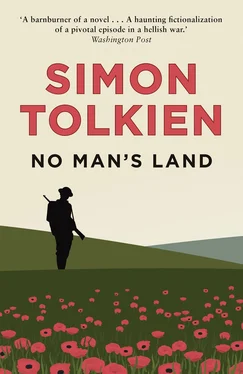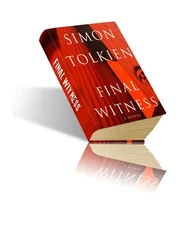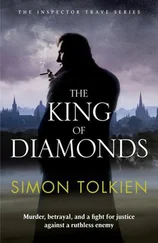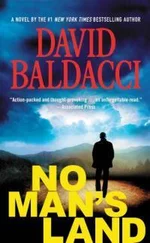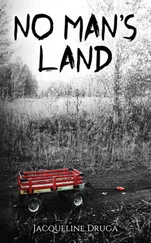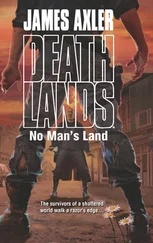Adam’s mother, Lilian, believed in God but Adam’s father, Daniel Raine, did not. He believed in something else instead, called socialism, which Adam didn’t understand until later, even though his father tried to explain it to him sometimes. Adam’s mind wasn’t yet ready for abstract concepts. God was different. He couldn’t see God, of course, but he could feel his presence in the high fluted arches of the Holy Martyr Church with the soaring white spire that he went to with his mother on Sunday mornings. God – as Adam pictured him – had a huge head and a white snowy beard and he lived up above the grey London clouds, gazing down at his creation with big eagle eyes. He was surrounded by a throng of ancient saints who had slightly shorter beards and a lesser number of winged angels who did not. They were extra eyes in case God needed them.
And God was not happy. In fact he was angry, filled with ‘a righteous rage’ according to Father Paul, an old priest with red mottled cheeks and thick grey bushy eyebrows that met in a wiry tangle in the middle of his wrinkled forehead, who was the rector of the Holy Martyr. God was incensed not by the poverty and injustice that Adam’s father complained about, but by the wickedness and debauchery, the unbridled lechery and fornication, that was going on day and night down below. Adam wasn’t clear what these sins were but he knew they were bad, very bad. ‘Repent; repent now before it is too late,’ the rector shouted at them all from the high, elaborately carved pulpit. Adam watched fascinated as beads of perspiration formed in the crevices of the old man’s face and trickled down, dripping in globules on to his surplice. He sat very still, clutching his mother’s hand, and wanted to urinate.
‘Will Daddy go to hellfire?’ he asked her as they crossed the park afterwards, going back home under a leaden November sky.
‘No,’ Lilian said. ‘Definitely not. Your father is a good man.’
‘But he doesn’t believe,’ said Adam. ‘And Father Paul says that if you don’t believe, you can’t be saved. That’s what he said. I heard him.’
‘Jesus died for all of us,’ she said, squeezing her son’s hand. ‘He loves us. You need to know that.’ And he was grateful to his mother for the reassurance, even though what she said didn’t make much sense. Adam didn’t like to think about Jesus if he could help it, bleeding to death on the big wooden cross, stuck up there under the hot sun in that horrible Golgotha place with all those Roman soldiers gawping at him; and he was secretly glad when his father said that the Bible was all lies, stories that the rich had made up to keep the poor in their place, doing the rich man’s bidding.
‘“The opium of the people”: that’s what Karl Marx called religion and he was absolutely right,’ Daniel Raine shouted at his wife across the kitchen. ‘It’s the promise of heaven to justify a hell while we’re alive. The hell we’re living in now,’ he added for good measure.
When his father raised his voice, Adam was frightened and slipped down under the table where he could push the black-and-silver-painted train with real tiny wheels that his father had made for him up and down the patterned lines on the oilcloth-covered floor. They were like the web of railway tracks he had seen at King’s Cross Station when his mother had taken him there in the summer to see the steam trains coming and going in all their smoky glory.
He could still see her from where he was, standing at the range, stirring a pot with a big wooden spoon. There were onions in the soup she was preparing; he could smell them, and perhaps that was why there were tears in her eyes. Adam didn’t know and he would have liked to run to her and put his arms around her thin waist, encircling her in a tight embrace, but he knew instinctively that he had to stay where he was; that he couldn’t stop the trouble because the argument was about more than God and the man called Marx that his father so admired. It was about his father being out of work again and there not being enough money to pay for what they needed to buy.
The next day two men in brown overalls came with a horse cart and took away the piano that stood in pride of place in the front room of their small house. They brought a paper and said it was by order because Adam’s father hadn’t kept up with the payments. Adam knew what ‘by order’ meant. It meant there was nothing you could do; it was the same as if God had ordered it as a punishment because you had sinned. There was no right of appeal.
Lilian had played the instrument sometimes in the evening, her long beautiful fingers caressing the keys, gliding in a space of their own. Her music was different from the barrel-organ waltzes the hurdy-gurdy man played – thinner and frailer and sadder, full of sweetness and loss, hinting at places far away that had vanished from the world. And Daniel would sit on an upright chair in the corner of the room, listening to his wife play with bowed head and folded hands, quite still; as though he was one of the devout worshippers in church on Sunday mornings, Adam thought, although he would never have dared say so.
Adam watched his father when the men came; watched the way his hands balled up into useless fists, rocking from side to side as he shifted his weight from one foot to the other and back again; and watched as he beat his head uselessly against the frame of the front door after they had gone.
‘It doesn’t matter,’ Lilian said, laying her hand gently on the back of her husband’s shoulder. ‘We don’t need it, Daniel …’
‘But we do,’ he shouted, refusing to turn around. ‘Life should be about more than grubbing around, trying to stay alive. We’re not animals to be given just enough food and fuel to keep producing goods for the capitalists to sell until we get old and sick and are no more use to them any more. We’re entitled to more than that; we must be.’
It was as if he was asking a question but Lilian didn’t have an answer, unless she told her husband to trust in the Lord, and she knew better than to do that. And he was wrong about the fuel. They had none, and that evening Daniel broke up the chairs and burnt them in the hearth. They ate bread and dripping in the light of the flames and later that night Adam heard his mother coughing on the other side of the thin wall, on and on into the small hours, making Adam’s chest constrict in sympathy so he couldn’t sleep and prayed instead to the big angry God in the clouds to give his father work.
God didn’t answer at first. The building trade was always slow in winter and Daniel hadn’t helped his prospects over the years by his largely fruitless efforts to persuade his fellow workers to stand up for themselves and join the union. What jobs there were came in dribs and drabs, and Adam’s mother had to go out to work as a charwoman, bringing back scraps of meat to feed her family. ‘Leavings from the rich man’s table’, Daniel called them in disgust, but the family missed them when Lilian fell ill, and he had to go and ask for help from the thin-lipped, tight-fisted relieving officer known to everyone on the street as ‘Old Dry Bones’.
Daniel came back furious. ‘Told me that I should put my new suit on next time I came,’ he said. ‘I told him that if I had a new suit I’d pawn it to get what I need rather than coming cap in hand to the likes of him. Like going in front of a judge and jury it was.’
Adam’s Sunday clothes had long ago been pawned. To begin with, his mother would take them in on Monday morning and then queue up on Saturday night to redeem them for use the next day. And at church she told Adam not to kneel but just to sit on the edge of the bench and lean forward, as she was worried about him getting the trousers dirty. But when she got sick she stopped going to church and the pawn ticket stayed where it was, gathering dust on the front-room mantelpiece, across from the bare patch on the wall where the piano had once stood.
Читать дальше
